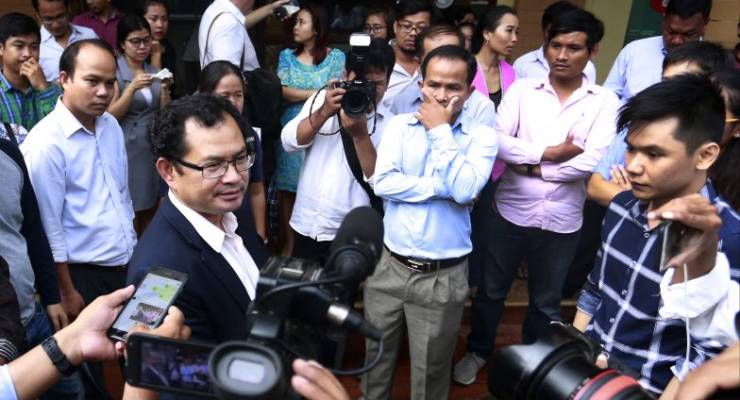
A year ago, Cambodia was considered to have the most fiercely independent press in the region. Now with The Cambodia Daily and around 30 other media outlets shuttered, The Phnom Penh Post sold and feared muzzled and the opposition party criminalised, Hun Sen’s crackdown on critical and independent voices has reached its endgame.
Last weekend’s sale of Cambodia’s The Post is a prime example of the hierarchical, nepotistic ways media businesses operate in Cambodia, with journalistic principles of independence and separation between the publisher and editorial lines blurring or non-existent.
With the national elections expected to be held in July, it begs the question of which media players are left in the field, and the pickings are slim.
Decline of impartial media
While institutions like The Post, The Daily, Voice of Democracy and Radio Free Asia had long been known and lauded for their impartiality in Cambodia, they have always been exceptions in a media landscape dominated by pro-government outlets that simply act as mouthpieces controlled by Hun Sen’s family and the ruling Cambodian People’s Party.

An independence ranking graph from CCIMs 2017 “Challenges to Independent Media” report.
As Phil Robertson, deputy Asia director for Human Rights Watch bleakly put it during BBC World News Hour on Monday, “Were looking at a clean sweep, we’re looking at an end to any significant independent media in the country.”
These close media ties between outlets and the government have been made abundantly clear over the years, a Reporters Without Borders (RSF) report released in March noting, “… media ownership is largely concentrated in the hands of a small number of leading businessmen linked to the ruling party. This is particularly so with the broadcast media. The four main TV channels, which have 80% of Cambodia’s viewers, are all run by government members or associates.”
In 2017 Cambodia Centre for Independent Media’s report on Challenges for Independent Media, stated the ongoing harassment of independent journalists was “business as usual,” and journalists at pro government organisations, accustomed to years of interference from business and politicians “toe the line”.
Hun Sen’s continuing harassment, jailing and shuttering of critical voices over the last year has only reinforced his grip on the levers of legal and political power with Cambodia’s press freedom rating dropping a full 10 points 142 between 2017-18, in RSF’s most recent assessment last month.
A legally murky court case and tax bill that plagued The Post before its Australian owner, Bill Clough, sold the paper over the weekend to Malaysian businessman Sivakumar Ganapathy. Ganapathy is managing director of a public relations company, Asia PR, which lead to the bill being settled out of court and raised questions about the new owners ties.
New owners, new rules
Their first action when representatives arrived in The Post’s office on Monday was to try and take down the article linked to the sale and the background of the new owners, the article stating Ganapathy’s company’s clients have included Hun Sen. For many, this solidified the view that the paper was now entirely within the government’s grip.
As of Tuesday evening, every single foreign reporter at The Post has resigned.
“With Cambodian public administration so desperately lacking in transparency, The Post has played a vital role in ensuring accountability in public life, as well as the Cambodian public’s right to independent information,” Chak Sopheap, director of Cambodian Center for Human Rights said via email on Tuesday.
“These moves to undermine its editorial independence represent a tragedy for press freedom and human rights in the kingdom.”

A picture taken by Post reporter Alessandro Sassoon, after the resignations via Twitter
In a highly corrupt political and business landscape, it may not be long before these ethical quandaries bleed their way onto the page: such as at Cambodia’s other English-language newspaper, The Khmer Times.
Owned by another Malaysian citizen, Mohan Tirvgmanasam Banddam, or T. Mohan. The paper’s funding has been linked to the country’s glitziest casino, Naga World — which last year made US$21.1 billion, more money than the entire GDP of Cambodia in 2016 — and Hun Manith, director of Cambodia’s military intelligence unit and son of Hun Sen.
Former editor of both The Khmer Times and The Post, Alan Parkhouse, said he does not have high hopes for The Post’s future as an independent outlet, given the new owner’s background.
“The Post’s new owners are Malaysian, there is not a history of independent media in that country,” he said via email. Indeed, Malaysia ranks three spots lower on RSF’s index than Cambodia.
For Sopheap, this latest blow to press freedom runs in stark contrast to the democratic Cambodia that was envisioned in the Paris Peace Agreements and the 1991 Constitution.
“Without doubt, an alternative vision for Cambodia is being realised,” she said.
“Just how that Cambodia will ultimately look is anybody’s guess — the Cambodian public have certainly not been consulted, or informed.”
Disclosure: Mark Tilly was an intern at The Cambodia Daily in 2015 and as a journalist at The Khmer Times in 2016-2017.







Crikey is committed to hosting lively discussions. Help us keep the conversation useful, interesting and welcoming. We aim to publish comments quickly in the interest of promoting robust conversation, but we’re a small team and we deploy filters to protect against legal risk. Occasionally your comment may be held up while we review, but we’re working as fast as we can to keep the conversation rolling.
The Crikey comment section is members-only content. Please subscribe to leave a comment.
The Crikey comment section is members-only content. Please login to leave a comment.